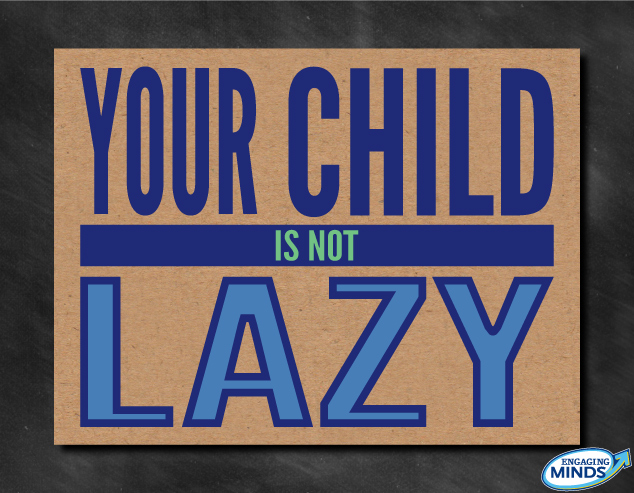Blog
Your Child is Not Lazy
 Your child is not lazy. Sure, the signs may be there: he rushes through his homework (if he does it at all), he does just enough to get by, his grades are all over the map, you rarely see him studying for exams, and he lacks motivation. It’s easy to understand how one may infer laziness from these behaviors. But for many students, that’s not the whole story. In fact, when you dig beneath the surface you may be surprised to find that it’s not laziness at all.
Your child is not lazy. Sure, the signs may be there: he rushes through his homework (if he does it at all), he does just enough to get by, his grades are all over the map, you rarely see him studying for exams, and he lacks motivation. It’s easy to understand how one may infer laziness from these behaviors. But for many students, that’s not the whole story. In fact, when you dig beneath the surface you may be surprised to find that it’s not laziness at all.
For many students, what seems to be laziness is actually a shield they use to protect themselves from doing all they can to succeed. What we see on the surface is a child who does not (or will not) engage in academic pursuits when it might very well be an executive function issue. As defined by Cooper-Kahn & Dietz (Late, Lost and Unprepared), executive functions are a set of processes that aid in managing one’s self and one’s resources in order to achieve a goal. So if your child hasn’t yet learned how to manage himself and his resources, how can he fully and confidently engage in his academic life?
Please consider the following executive function challenges that may be at the root of your child’s “laziness” and some tips you can put into place to help your child overcome them.
Your child is overwhelmed. And what’s the easiest way to handle feeling overwhelmed? Shut down and pretend the work doesn’t exist!
How you can help:
- Model for your child how to break tasks down into manageable pieces. When he sees that he only needs to spend 30 minutes each night on an assignment to get it done by the end of the week, the assignment becomes much less daunting.
- Teach your child how to use a calendar to map out his day, week, and month. Include everything: homework assignments, extracurricular activities, play dates. Your child will quickly see that while busy, if he plans ahead, there’s enough time to do everything.
Your child has a problem initiating tasks. He doesn’t know how or where to begin.
How you can help:
- Set clear expectations for homework time and develop a routine that is consistent day-to-day. With these expectations in place, it will be clear when it’s time to begin.
- Start the task with your child or get him started on something concrete (rather than just talking about what needs to be done).
- Model for your child how to break down the directions to ensure he understands what exactly he needs to do. Directions – especially multi-step directions – can be confusing, and simplifying them makes the entire assignment that much more accessible.
Your child may be anxious and fear failure. It is that much more difficult to tackle an assignment when he automatically assumes he won’t be successful.
How you can help:
- Reward effort, not just achievement. Let your child know – in very clear terms – that it’s the effort he puts in that is most important. If you take the spotlight off the end result and focus on the path to get there, your child will likely end up with a grade of which he can be very proud.
- Model for your child how to make and handle mistakes. It’s okay to make mistakes – mistakes are opportunities to learn! Very few people get it right the first time. It takes perseverance and some trial-and-error to get something right. Learning from our mistakes makes us stronger students.
Your child may have another learning challenge that is getting in his way. Perhaps your child has an undiagnosed learning disability.
How you can help:
- Have a discussion with your child’s teachers. Do they see anything unusual or worthy of concern?
- Have a discussion with your child’s pediatrician. Perhaps educational testing can help uncover what’s going on.
Finally, it may be a good idea to get your child some academic support for these executive function challenges. Perhaps there’s someone at school who can coach him through his homework or perhaps a private tutor is your best bet. Outside support is available and it’s worth looking into, especially if your child balks at working with you (which is normal, not to worry!).
When all roads seem to lead to a lack of motivation, dig a little deeper and see what you uncover. It’s actually quite unlikely that your child is lazy.

